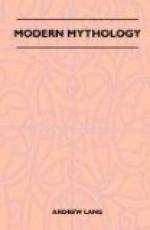Now, in all sciences there are differences of opinion about details. In comparative mythology there was, with rare exceptions, no agreement at all about results beyond this point; Greek and Sanskrit, German and Slavonic myths were, in the immense majority of instances, to be regarded as mirror-pictures on earth, of celestial and meteorological phenomena. Thus even the story of the Earth Goddess, the Harvest Goddess, Demeter, was usually explained as a reflection in myth of one or another celestial phenomenon—dawn, storm-cloud, or something else according to taste.
Again, Greek or German myths were usually to be interpreted by comparison with myths in the Rig Veda. Their origin was to be ascertained by discovering the Aryan root and original significance of the names of gods and heroes, such as Saranyu—Erinnys, Daphne—Dahana, Athene—Ahana. The etymology and meaning of such names being ascertained, the origin and sense of the myths in which the names occur should be clear.
Clear it was not. There were, in most cases, as many opinions as to the etymology and meaning of each name and myth, as there were philologists engaged in the study. Mannhardt, who began, in 1858, as a member of the philological school, in his last public utterance (1877) described the method and results, including his own work of 1858, as ‘mainly failures.’
But, long ere that, the English cultivated public had, most naturally, accepted Mr. Max Muller as the representative of the school which then held the field in comparative mythology. His German and other foreign brethren, with their discrepant results, were only known to the general, in England (I am not speaking of English scholars), by the references to them in the Oxford professor’s own works. His theories were made part of the education of children, and found their way into a kind of popular primers.
For these reasons, anyone in England who was daring enough to doubt, or to deny, the validity of the philological system of mythology in general was obliged to choose Mr. Max Muller as his adversary. He must strike, as it were, the shield of no Hospitaler of unsteady seat, but that of the Templar himself. And this is the cause of what seems to puzzle Mr. Max Muller, namely the attacks on his system and his results in particular. An English critic, writing for English readers, had to do with the scholar who chiefly represented the philological school of mythology in the eyes of England.




